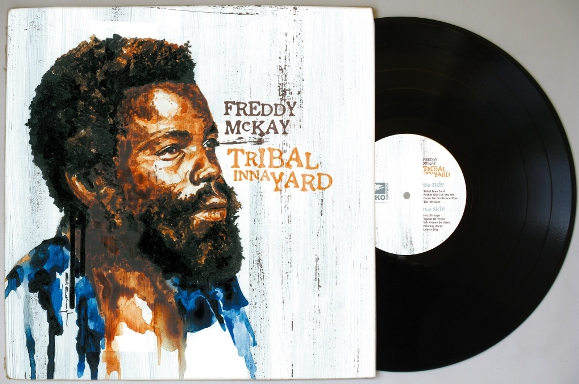
Freddie McKay is an enigmatic figure in the history of reggae – not least because of his anguished, eerie yet deeply human voice. Like the better-celebrated Delroy Wilson, he was more of a singer than a songwriter, but could imbue even the most trite or off-the-cuff sounding lyrics with the outer reaches of mortal passion. Like Otis Redding, his singing had a distinct pang of pain when tackling the most celebratory of festival songs – as if hurt were just around the corner.
Over the minor key roots rhythms of the 1970s he was a consummate master of twilight sufferation and dread, even when sharing matters of the heart. His death from a heart attack in 1986 feels all the more tragic for occurring just a few years before the first major reissue programmes for underrated roots singers like his friend Sylford Walker. Since that time he has remained a cult hero, a singer’s singer and a reggae fan’s reggae artist.

Freddie McKay was born in St Catherine Parish in 1947. Like many singers of his day he moved around from producer to producer, recording for Prince Buster, then Duke Reid (their Love Is A Treasure is sampled for the remix of Rasta Impostor byKonshens) before cutting his critically acclaimed debut album at Studio 1. Three years later in 1974 he delivered the extraordinary, underestimated Lonely Man set at Dynamic for Neville Hinds and Warwick Lyn (engineer for another departed legend – Leslie Kong), later assembling albums for Alvin GG Ranglin (1977 ‘Doin’ It Right‘ – which is actually available on iTunes) and Ossie Hibbert (1982’s vocal/dub showcase ‘Creation’). These LPs all go for silly money online, bypassing the family of the man himself. This welcome vinyl repress by France’s Iroko Records of his penultimate 1983 platter forLinval Thompson, in the prevailing early dancehall style, captures both McKay and classical reggae music at their apex before the digital switchover of 1985.
Just as Freddie adapted from the rocksteady amble of the 60s to the upbeat reggae ofCoxsone Dodd and Lyn to the rockers of Channel One, here he is entirely at home with Thompson’s slow, questing inexorable Roots Radics played rhythms. Thompson’s productions represent the last throes of the so-called golden age of reggae and they have a particularly golden sheen. There is a crisp top end finish where you can feel each wire twang of every queasy bend of the percussionist’s flexatone or the steel strings inBingy Bunny’s plaintive chiming signature end-of-bar guitar motif. On the title track the effect is sweltering and hypnotic – and sums up the need to stay calm in the face of political war.

The contrast between this hard clanging backdrop and McKay’s hazy woozy vocals is especially pronounced on Hey Stranger, over the rhythm to Thompson’s own Curfew. The engineers at Channel One for these sessions included Crucial Bunny, Tom Tomand Scientist (the latter would remix Stranger for his peerless ‘Dub Landing Volume 1’). Meanwhile Youths of Today is a worthy next cut to Barrington Levy’s A Yah We Deh. Freddie also revisits his own past in Father Will Cut You Off – which appeared on his Studio 1 debut – and Lonely Man – the title piece to his follow up with Lyn/Hinds.
The reissues market has become increasingly fraught with controversy as, rightly, consumers are increasingly interested in the provenance of the music they buy. Yet the most cautious among us must surely admit that this LP, with decent sound quality and lovingly produced striking new artwork by Sil Cunningham and Cholo from Roots Fyah, is one of the absolute essentials of 2013. In time this album is likely to become subject to the same pressures from the secondhand market as Freddie’s original presses. But hopefully further reissues will follow (Lonely Man and 1983’s Gorgonrelease Harsh Words are prime candidates) so that he will be an accepted part of reggae’s (and soul music’s) wider canon and a singer’s singer no more.


You must log in to post a comment.